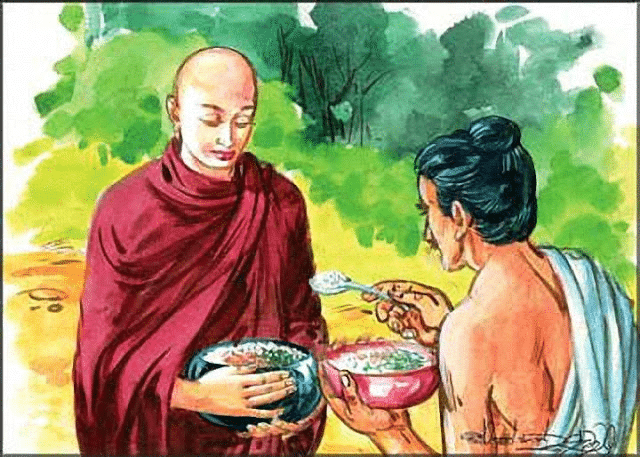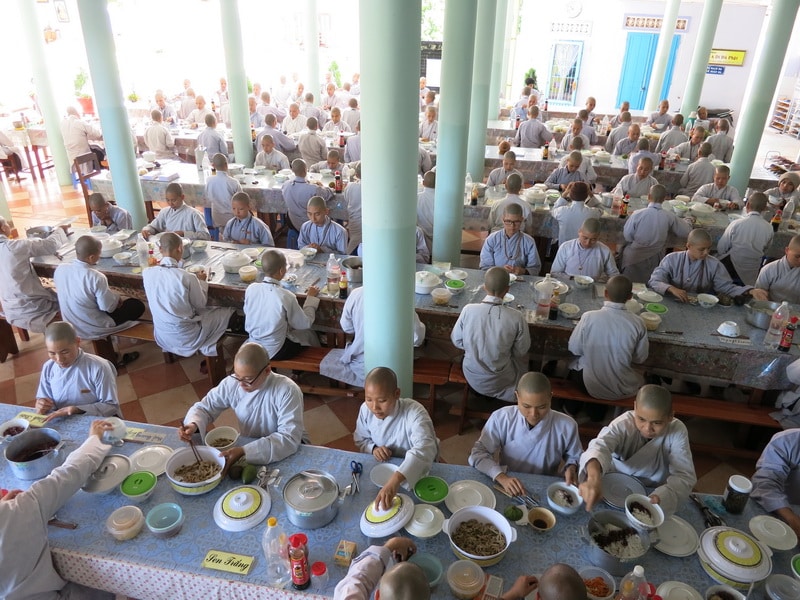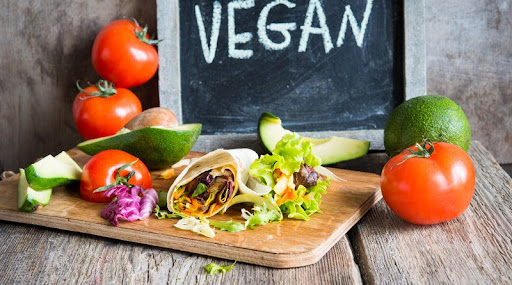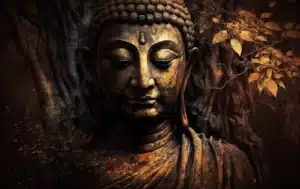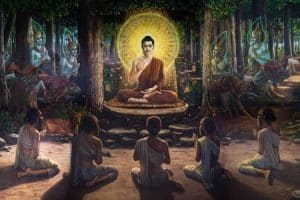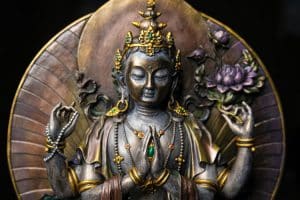Vegetarianism in Buddhism is a dietary practice that avoids meat and often products made from animal meat. This practice reflects the core Buddhist values of non-harming and compassion.
In Buddhism, the first of the Five Precepts is to abstain from killing, which is considered a call for vegetarianism for monks. However, the interpretation and practices of vegetarianism may vary between traditions, cultures, and individuals.
When someone talks about Buddhism, they think all followers maintain a strict vegetarian diet. However, if you take a closer look, you will see that this is not the case.
Contrary to popular belief, not all Buddhists are vegetarians. Views on vegetarianism vary significantly between different Buddhist sects and between individual practitioners. So it raises the key question: Is vegetarianism an essential commitment for one to be considered a genuine Buddhist monk? There is no single answer to this question for many different reasons.
A historical perspective provides clarity on this topic. The founder of Buddhism, Siddhartha Gautama was not a vegetarian. As recorded in the Pali Canon, Buddha did not strictly prohibit his disciples from eating meat.
In fact, Buddhist monks, commonly known as Bhikkhus, are allowed to eat meat if it is offered to them in their alms bowl. The basic principle is gratitude: Bhikkhus happily accept and accept food offered by lay people, sometimes including meat, and of course they cannot refuse it.
Therefore, we must approach the subject of Buddhism and vegetarianism with a deep understanding, recognizing the differences and complexities inherent in this religious tradition.
When are Buddhist Monks Allowed to Eat Meat?
In Buddhist teachings there exists a profound understanding of meat consumption. It must be noted that although meat consumption is not completely prohibited, there are strict conditions for its permission.
As Buddhist monks, they must follow a strict code of ethics such as not accepting meat if there is any suspicion that an animal was killed solely for their food. However, meat comes from animals that have died naturally. Buddhist families do not want to waste it, so making it into a dish to offer to monks is acceptable.
Furthermore, During the Buddha’s time, certain types of meat were clearly identified that practitioners should abstain from. This list includes horses, elephants, dogs, snakes, tigers, leopards and bears. The reasons behind this ban can range from health concerns and potential life-threatening risks to the conservation of endangered species. Since only certain types of meat are prohibited, we can infer that the consumption of meat under certain conditions is permissible according to Buddhist teachings.
Is Vegetarianism Keeping the Precept “Not to Kill”?
The first precept of the Five Precepts advises Buddhists against actions that harm the lives of living beings. This means that Buddhists should not kill, participate in acts of killing or cause any harm that leads to the death of any living being.
However, this raises a question about the early Buddhist practice of eating meat: does it indirectly run counter to this commitment to preserving life? To address this issue, scholars argue that consuming meat from animals that die naturally or are not specifically slaughtered to satisfy one’s own consumption is not the same as intentionally violating the first Precepts in Buddhist ethical rules.
During Siddhartha Gautama’s time, monks adopted a mendicant lifestyle, relying on alms to survive, with no permanent monastic settlement until after the Buddha’s death. These monks do not live in isolation; Their livelihood depends on food grown, provided or exchanged by the lay community. However, it is difficult to know that the meat provided to the entire Sangha does not originate from animals killed purposefully for the monks.
As a result, the Mahayana Buddhist tradition began to emphasize vegetarianism to minimize any indirect involvement with the death of living beings. Classical texts in the Mahayana school such as the Lankavatara Sutra lay out stricter vegetarian teachings.
The View on Vegetarianism in Modern Buddhism
Views on vegetarianism in modern Buddhism vary significantly between sects and even within specific traditions. In general, monks in the Theravada Buddhist tradition continue to eat meat (very sparingly), and they view vegetarianism as an admirable personal choice rather than a mandatory practice.
Vajrayana schools such as Shingon and Japanese Buddhism advocate vegetarianism but do not consider it an important aspect of spiritual progress.
Most practitioners of the Mahayana tradition follow a vegetarian diet and abstain from meat, especially those who follow Pure Land Buddhism. However, even among these sects, many different practices and beliefs exist.
In keeping with the original precepts, some monks are not allowed to buy their own meat or have the right to choose a live lobster out of the tank and have a chef boil it… but they can eat a meat offering seems. This diversity of dietary practices highlights the rich tapestry of beliefs and interpretations in modern Buddhism, emphasizing the importance of individual and communal choice in the spiritual journey .
The Right Way to Eat Vegetarian Food with Buddhist Teachings
If you learn about Buddhism long enough, you will know that this religion advocates the Middle Way – which means that practitioners must avoid extreme asceticism and self-indulgence. Therefore, you should not be too attached or rigid in your approach to practicing vegetarianism.
LotusBuddhas observed that some individuals become overly enthusiastic after adopting a vegetarian diet for just a few months, mistakenly believing that they have made significant spiritual progress. Some even refuse to use utensils that have touched meat for fear that this might violate their vows or negate their virtuous efforts.
Such strict practices can not only lead to self-deprivation but can also strain relationships with those around you. The Buddha emphasized the Middle Way to prevent the pitfalls of extreme dogmatism and excessive rigidity. Buddhists are therefore cautioned not to become overly obsessed with their vegetarian dietary practices.
The central teaching of Buddhism is the practice of “metta” or unconditional love for all living things. The choice to be vegetarian in Buddhism is primarily rooted in compassion for animals and not out of fear of potential negative consequences as some may perceive.
In essence, there is nothing wrong with the meat itself; Rather, you need to emphasize cultivating wisdom and compassion in tandem. Similarly, wisdom and compassion are likened to two wings of a bird – you cannot fly high with just one wing.
Example: Suppose you visit your grandmother, whom you have not seen in a long time. You go to her house and find that she cooked your favorite dish when you were a kid, grilled pork chops. She doesn’t cook often because her aging body doesn’t allow her to move around the kitchen like she used to.
But it was the dearest wish from her heart for you, the happy look in her eyes when she saw you nibbling on every piece of meat stuck in the pork ribs the way you did when you were a kid. She has been looking forward to this for many years.
True Buddhist wisdom goes beyond the literal meanings of words. LotusBuddhas believes that if you hesitate even for a moment when considering a piece of grilled pork, you may not have grasped the full depth of the Buddha’s teachings.
Indeed, it is an undeniable fact that life in this world requires certain compromises. Every individual, whether intentionally or unintentionally, is involved in the death of some living being. To have vegetables and fruits considered ‘pure’ vegetarian options, farmers must spray pesticides, kill insects, and dig up the soil, affecting the microscopic habitats of countless microorganisms object.
According to the principle of Dependent Origination, vegetarians indirectly bear the burden of this ecological disruption, in the same way that some people view meat consumption as indirectly harming animals.
Consider your daily activities such as driving. You cannot pay attention to the road and pay attention to small creatures crawling on the road surface. Everyone is thus trapped in a complex web of harm and destruction; As long as we exist, avoiding killing will be very difficult to do.
The death of one cow can feed hundreds of people, while a bunch of vegetables can feed one animal but at the cost of countless smaller lives that vegetarians do not think about. Thus, we must follow the Middle Path that Buddha advocated – which is depending on the conditions of practicing dharma.
Choosing to be vegetarian is commendable, but it is equally important to carefully consider the ethical implications behind all the products we use. A vegan shoe will lose its ethical superiority if it is produced under exploitative conditions. Power plants, iron and steel factories or wood factories contribute to the destruction of the habitat of many living creatures, you will not use it!
As disciples of the Buddha, our responsibility is not just to blindly follow written instructions. Instead, it lies in recognizing the ripple effects of our choices and acting wisely to minimize the harm. It is wise to reflect on the nature of one’s spiritual practice and its manifestation in daily life.
So, when you choose to be vegetarian, simply think of it as a compassionate practice that brings health, not as a measure of spiritual progress. Avoid fanaticism and realize that it is just one aspect of a broader spiritual journey. Changing your diet is easy but changing your thoughts, words and actions is difficult.


